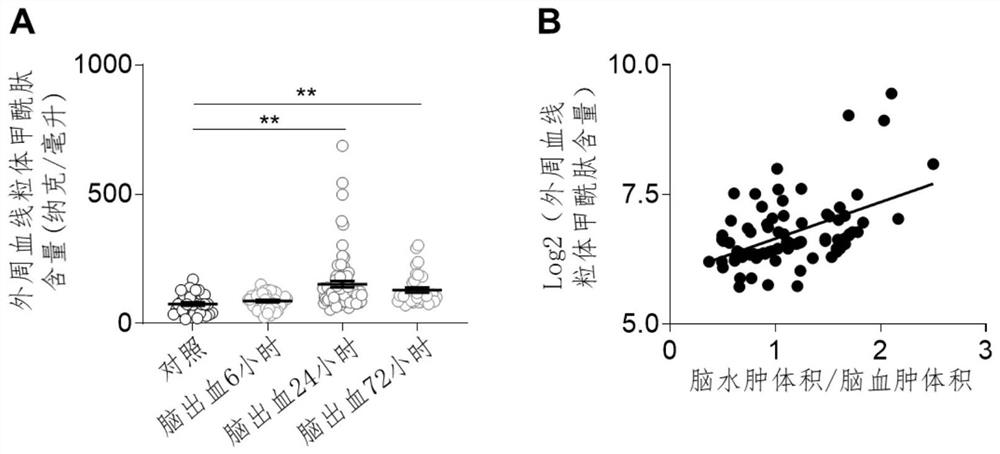Method and Application of Detecting Formyl Peptide or Formyl Peptide Receptor-1 Ligand Content
A formyl peptide and ligand technology, applied in the field of biomedicine
- Summary
- Abstract
- Description
- Claims
- Application Information
AI Technical Summary
Problems solved by technology
Method used
Image
Examples
Embodiment 1
[0049] Example 1: CT image and volume assessment of PHE and hematoma
[0050] Patients with cerebral hemorrhage were enrolled, and the fourth-generation CT scanner (Somatom 64 or Somatom AS+, Siemens Healthcare, Erlangen) was used for cranial CT tomography. Each scan contained a multi-slice spiral CT data set (1-24 slices, slice thickness 5mm ). Draw the injury area and hematoma outline on each slice of the head CT image, use MRIcron software (Chris Rorden's MRIcron, version 4AUG2014) to calculate the volume of the injury area and hematoma, and use the formula to calculate the volume of perihematoma edema (PHE) : PHE volume = lesion area volume - hematoma volume. In order to evaluate the PHE volume more accurately, we counted the 24-hour CT scan images of cerebral hemorrhage, and recorded the PHE volume and hematoma volume of patients with cerebral hemorrhage. We collected blood samples 24 hours after cerebral hemorrhage from these cerebral hemorrhage patients (see Example...
Embodiment 2
[0051] Example 2: Quantitative detection of plasma mitochondrial N-formylphthalein ELISA
[0052] Human methionine (fMET) ELISA kit was used to detect the content of plasma mitochondrial N-formylphthalein according to the finished product instructions. Plasma samples were diluted 1:5 with the sample diluent in the kit before adding to the ELISA plate.
[0053] 2.1 Sample collection and storage
[0054] Plasma—Samples are collected in collection tubes containing anticoagulant EDTA or heparin, and centrifuged at 1000g for 15 minutes at 2-8°C within 30 minutes after sample collection. Collect the supernatant and assay immediately, or store supernatant samples in batches at -20°C or -80°C for later use. Avoid repeated freezing and thawing of samples. Note: Samples should be centrifuged sufficiently to avoid hemolysis or the presence of particles.
[0055] 2.2 Preparations
[0056] Bring all reagents to room temperature before use. If crystals form in the concentrated buffe...
PUM
 Login to View More
Login to View More Abstract
Description
Claims
Application Information
 Login to View More
Login to View More - R&D
- Intellectual Property
- Life Sciences
- Materials
- Tech Scout
- Unparalleled Data Quality
- Higher Quality Content
- 60% Fewer Hallucinations
Browse by: Latest US Patents, China's latest patents, Technical Efficacy Thesaurus, Application Domain, Technology Topic, Popular Technical Reports.
© 2025 PatSnap. All rights reserved.Legal|Privacy policy|Modern Slavery Act Transparency Statement|Sitemap|About US| Contact US: help@patsnap.com

